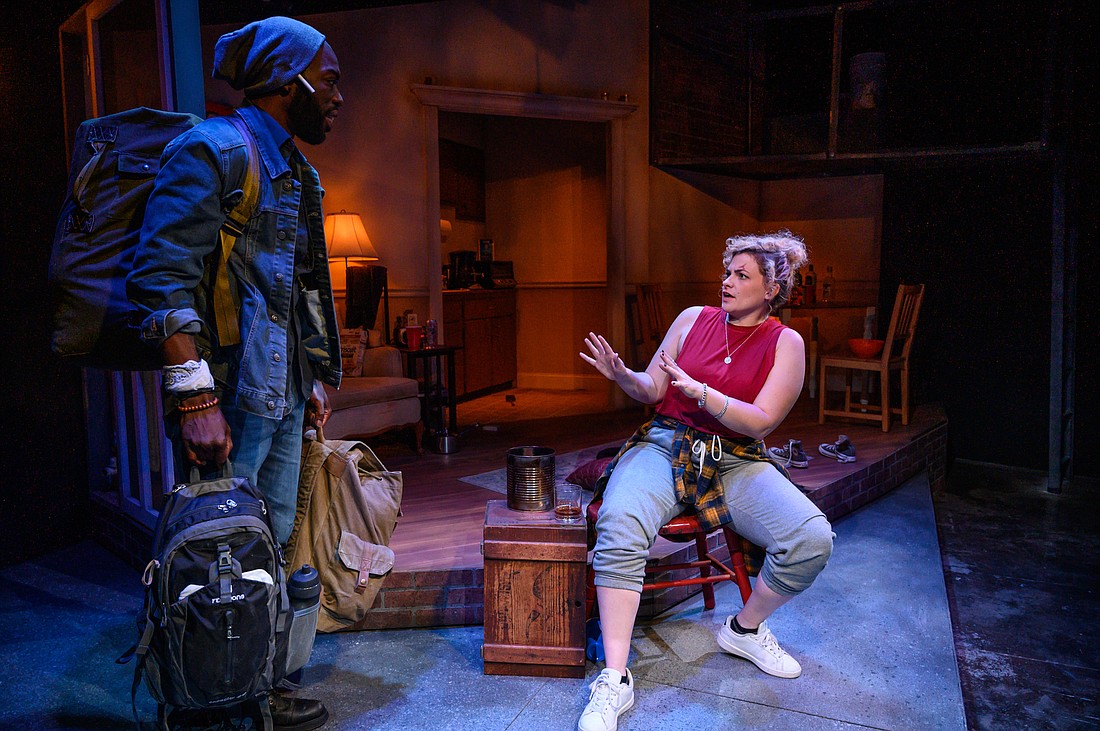- November 19, 2025
-
-
Loading

Loading

Youth is wasted on the young. As a corollary, the young are frequently wasted. When adult responsibility finally dawns, it can feel like a bad hangover. Ike Holter’s “Sender” explores that long morning-after at Urbanite Theatre.
The play’s narrative is a shattered mosaic. Putting the pieces together, here’s the picture:
Sometime in the mid-2000s, a group of young Midwest hipsters became a family, a commune or a cult. Call them what you will — they were close. Lynx (L. James), a slippery, charismatic jive talker, was the de facto leader.
His minions included Tess (Mary Williamson), a misfit with a useless art major; Jordan (Ryan Leonard), a passive slacker; and Cassandra (DeAnna Wright), the group’s designated adult. After a decade of wretched excess, the party’s over. They all had problems. But Lynx was up to his eyeballs in debt to credit card companies, banks and possibly loan sharks. To ditch that monetary millstone, Lynx faked his death and vanished. Tess and Jordan mourned him. Cassandra saw through him. 366 days later, Lynx returns, still officially dead and incognito. Tess and Jordan have emotional meltdowns. Cool Cassandra offers Lynx a bribe and an ultimatum: Get out of town for good, or I’ll make damn sure you’re dead for real. Cassandra splits; the others stay. They weep, shout, berate, slap, hug and finally get high. Lynx tells a tall tale about a magical land in Wyoming, and has a great idea —Hey! Let’s all run off there together! Jordan and Tess agree. The three hipster amigos celebrate with a night of group sex. The beautiful dream dies at dawn when ugly reality comes knocking.
Brendan Ragan directs this not-coming-of-age story with gut-level commitment. The four characters are like cats in a bag. They howl, rip into each other, claw out secrets. It’s not pretty. But that’s the play, and half-measures won’t do. Ragan doesn’t hold back.
The actors are mesmerizing inside this ugly reality. Structurally, the play turns you into an invisible home invader. You bust in on four characters in Tess’ lousy Chicago flat. And you can’t help but watch. If the actors make you squirm, you they’re doing their jobs.
James’ Lynx gets the hardest job of all. It’s always fun to play the bad guy. But Lynx isn’t a standard-issue heel. He’s the ex-leader of this hipster pack, and he’s supposed to be charismatic. James sells you on Lynx’s 1,000-watt animal magnetism. But you never know if it’s all a front. Williamson’s Tess is a hard-bitten drunk who boasts of her successful rehab while kicking back whiskey. She’s not loveable today. You can tell she used to be.
Leonard’s Jordan is a slacker with a man-crush on Lynx. His emotional age is 13, at best. You’d figure he’d sit alone in his trailer playing Red Dead Redemption all night. But, along with paying the bills, Cassandra’s having Jordan’s baby and agreed to marry him. Love is strange, right? Wright’s Cassandra has her act together. For years, she’s played Wendy to a trio of Peter Pans. She cleans up their messes, packs their lunches and keeps them out of trouble. The hipster brats reward her with scorn. But Cassandra never complains.
This shabby slice of life unfolds in Tess’ low-rent apartment in Chicago. Jeff Weber has done a beautiful job creating her ugly living space. Sofia Gonzalez’ costumes deftly evoke the characters’ emotional armor. Cassandra dresses for success with no flash. Her severe tunic could almost be a military uniform. As for the others, their used and abused hipster garb is as faded as their dreams.
Holter’s a damn good writer. Reasons abound: His economical storytelling. His shorthand for story and character. The sprung-rhythm music of his unpredictable dialog. His fake-outs and feints. That’s just the short version. If I listed all the reasons, we’d be here all day.
This is an amazing play, but don’t take your mom. Heads-up: there are brief flashes of nudity and heaping helpings of profanity.
The point of all the sound and fury?
Ironically, Holter’s play is a perfect hipster illustration of a parent’s eternal lecture: “Grow up, get a job and start acting like an adult!”
That’s one conclusion. But Holter’s not trying to send a message. My hunch is he didn’t start with a moral. He started with a question: How can you keep your dreams alive?
Lynx tried to. The play sets him up as a scapegoat and drives him out of town. But Lynx might not be the bad guy. Low wages and debt killed his dream. Who’s the real bad guy?
Holter doesn’t answer that question. It’ll stay with you long after you’ve seen his play.